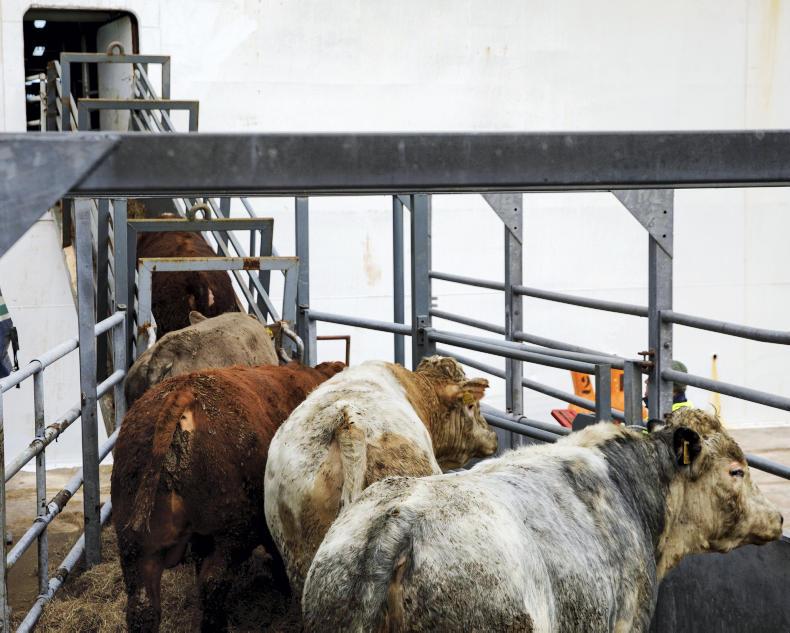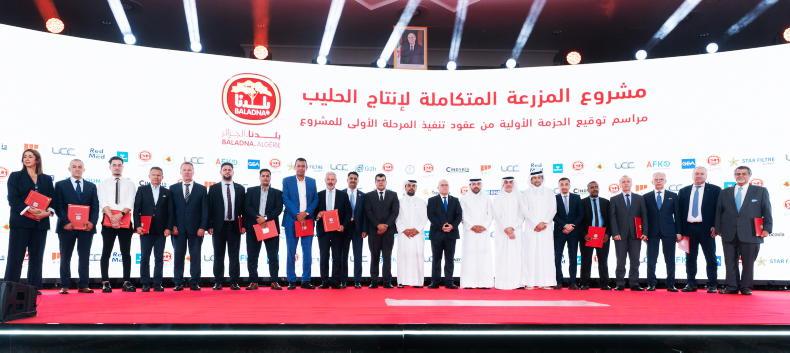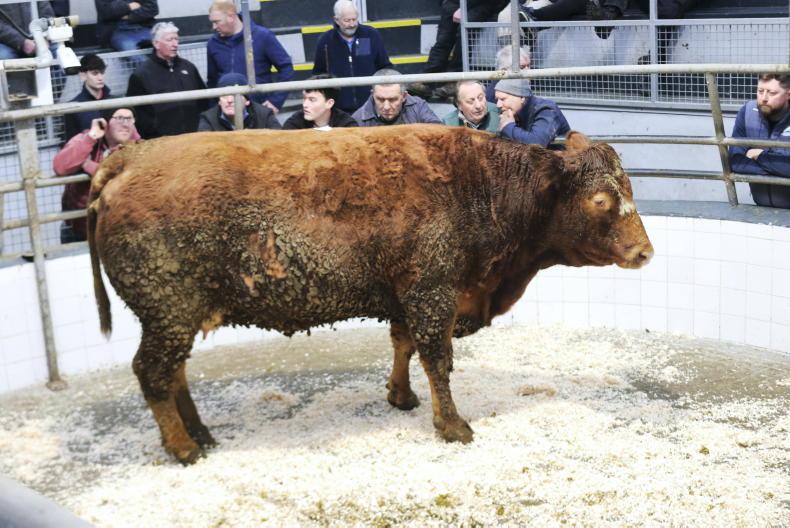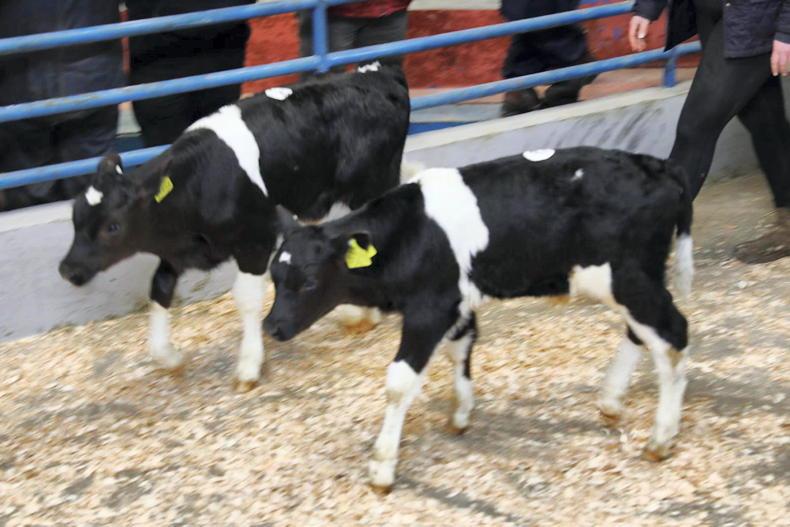The dozen remaining farmers owed payment for cattle exported to Algeria two weeks ago have now been paid in full.
Payment arrived over Tuesday morning and early afternoon, when banks reopened after the long weekend.
The Irish Farmers Journal understands that the price per kg liveweight was rounded upwards from the agreed price by the exporter as a goodwill gesture to these farmers.
The shipment was made up of 1,090 heavy bulls and bullocks and was the first shipment of cattle by the exporters, which are Roundwood Park Livestock and Premium Livestock.
Over half of the farmers who supplied cattle had been paid after the boat was loaded.
Next boat
The exporters plan to send a series of deliveries to Algeria over the coming months. The boat which made the first delivery, the Sarah M, has now returned to Irish waters and the exporters plan to fill a second load over the coming days.
A spokesman for the exporters said that they were now looking to improve the payment arrangement to avoid a repeat of the delays.
“We’re working to see if it would be possible for a mart to handle payment,” he said.
Teething problems and relieved farmers
The Irish Farmers Journal spoke to a number of the farmers who were waiting for payment. All said that the boat to Algeria was a valuable outlet for heavier cattle and that they would sell to the exporter again, but they wanted payment to be quicker.
Carlow finisher Leeson Tracey supplied about 100 cattle to the boat. He was relieved to get payment on Tuesday.
“It’s very important that bulls get out of the country,” the Tullow man said.
“It’s a great option for bulls over 24 months. The factories don’t want them, but they use them to lower the price of all cattle.”
He knows farmers who negotiated an extra 25c/kg for big cattle from factories last month because they had the option of going to the boat.
He got the equivalent of €3.65c/kg carcase by going to the boat, he reckons, or 30c/kg to 35c/kg more than was on offer from the factories.
He has more suitable cattle.
“I’d be happy to go again, but they need to facilitate quicker payment. I’ll go with them on condition payment is through a mart.”
Pat Foley from Shillelagh in Co Wicklow said that it was the exporters’ first time going with a boat of cattle and a few mistakes were made.
“I was never too worried. I believed the money would come, although I didn’t know how long it would take.”
He met with one of the exporters, Dr Ahmed Salman, a number of times. “I think he’s an honourable man. I couldn’t say a wrong word against him.”
He said: “But going forward it would be better if payment to the farmer was made through a mart or was up front.”
In that scenario, he’ll have no problem going again, he said.
John Joe Reilly from Granard, Co Longford, said that while there were teething problems with the first boat, he was always confident he would get paid.
“It’s a fantastic outlet and good competition for the factories. I’d like to see a boat go every fortnight. I’d be happy to supply cattle to them. Bulls would be €3/kg today only for the boats.”
He said that while payment was delayed, the exporters never shied away from talking to him and the other farmers. “We put a bit of pressure on them. But they always got back to us.”
He said: “The simplest thing now would be for them to lodge money with a mart. Farmers would have no problem paying a commission to a mart for weighing the cattle. Or perhaps they could lodge the letters of credit with a mart, if they’re strong enough.”
The dozen remaining farmers owed payment for cattle exported to Algeria two weeks ago have now been paid in full.
Payment arrived over Tuesday morning and early afternoon, when banks reopened after the long weekend.
The Irish Farmers Journal understands that the price per kg liveweight was rounded upwards from the agreed price by the exporter as a goodwill gesture to these farmers.
The shipment was made up of 1,090 heavy bulls and bullocks and was the first shipment of cattle by the exporters, which are Roundwood Park Livestock and Premium Livestock.
Over half of the farmers who supplied cattle had been paid after the boat was loaded.
Next boat
The exporters plan to send a series of deliveries to Algeria over the coming months. The boat which made the first delivery, the Sarah M, has now returned to Irish waters and the exporters plan to fill a second load over the coming days.
A spokesman for the exporters said that they were now looking to improve the payment arrangement to avoid a repeat of the delays.
“We’re working to see if it would be possible for a mart to handle payment,” he said.
Teething problems and relieved farmers
The Irish Farmers Journal spoke to a number of the farmers who were waiting for payment. All said that the boat to Algeria was a valuable outlet for heavier cattle and that they would sell to the exporter again, but they wanted payment to be quicker.
Carlow finisher Leeson Tracey supplied about 100 cattle to the boat. He was relieved to get payment on Tuesday.
“It’s very important that bulls get out of the country,” the Tullow man said.
“It’s a great option for bulls over 24 months. The factories don’t want them, but they use them to lower the price of all cattle.”
He knows farmers who negotiated an extra 25c/kg for big cattle from factories last month because they had the option of going to the boat.
He got the equivalent of €3.65c/kg carcase by going to the boat, he reckons, or 30c/kg to 35c/kg more than was on offer from the factories.
He has more suitable cattle.
“I’d be happy to go again, but they need to facilitate quicker payment. I’ll go with them on condition payment is through a mart.”
Pat Foley from Shillelagh in Co Wicklow said that it was the exporters’ first time going with a boat of cattle and a few mistakes were made.
“I was never too worried. I believed the money would come, although I didn’t know how long it would take.”
He met with one of the exporters, Dr Ahmed Salman, a number of times. “I think he’s an honourable man. I couldn’t say a wrong word against him.”
He said: “But going forward it would be better if payment to the farmer was made through a mart or was up front.”
In that scenario, he’ll have no problem going again, he said.
John Joe Reilly from Granard, Co Longford, said that while there were teething problems with the first boat, he was always confident he would get paid.
“It’s a fantastic outlet and good competition for the factories. I’d like to see a boat go every fortnight. I’d be happy to supply cattle to them. Bulls would be €3/kg today only for the boats.”
He said that while payment was delayed, the exporters never shied away from talking to him and the other farmers. “We put a bit of pressure on them. But they always got back to us.”
He said: “The simplest thing now would be for them to lodge money with a mart. Farmers would have no problem paying a commission to a mart for weighing the cattle. Or perhaps they could lodge the letters of credit with a mart, if they’re strong enough.”









SHARING OPTIONS